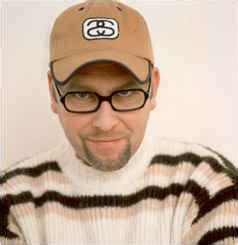Top 436 Endings Quotes & Sayings - Page 8
Explore popular Endings quotes.
Last updated on December 4, 2024.
[Rhyme is] but the invention of a barbarous age, to set off wretched matter and lame Meter; ... Not without cause therefore some both Italian and Spanish poets of prime note have rejected rhyme, ... as have also long since our best English tragedies, as... trivial and of no true musical delight; which [truly] consists only in apt numbers, fit quantity of syllables, and the sense variously drawn out from one verse into another, not in the jingling sound of like endings, a fault avoided by the learned ancients both in poetry and all good oratory.
Night was falling. Birds were singing. Birds were, it occurred to me to say, enacting a frantic celebration of day's end. They were manifesting as the earth's bright-colored nerve endings, the sun's descent urging them into activity, filling them individually with life nectar, the life nectar then being passed into the world, out of each beak, in the form of that bird's distinctive song, which was, in turn, an accident of beak shape, throat shape, breast configuration, brain chemistry: some birds blessed in voice, others cursed; some squeaking, others rapturous.
I'm sorry," I heard him say again. Then, out of the corner of my eye, I saw a sudden blur of movement as he slid out of his seat, left some bills for the breakfast he wouldn't eat, and walked away. And as he did, I thought again of those mornings in the hallway at school, way back in ninth grade. Everything had started in such sharp detail, each aspect pronounced and clear. Obviously, endings were different. Harder to see, full of shapes that could be one thing or another, with all the things that you were once so sure of suddenly not familiar, if they were even recognizable at all.
Obviously, where art has it over life is in the matter of editing. Life can be seen to suffer from a drastic lack of editing. It stops too quick, or else it goes on too long. Worse, its pacing is erratic. Some chapters are little more than a few sentences in length, while others stretch into volumes. Life, for all its raw talent, has little sense of structure. It creates amazing textures, but it can't be counted on for snappy beginnings or good endings either. Indeed, in many cases no ending is provided at all.
All of women's stories in the 19th century had either one of two endings: you either had the good Jane Austen marriage at the end and you were happy; or you had the terrible Henry James savage downfall because of your own hubris as a woman, or you've made some great error leading you down a path to ruin. One is the story of love that's successful and the other is the story usually of reckless love that goes terribly wrong that destroys the woman.
At the happy ending of the Tempest, Prospero brings the kind back togeter with his son, and finds Miranda's true love and punishes the bad duke and frees Ariel and becomes a duke himself again. Everyone - except Caliban - is happy, and everyone is forgiven, and everyone is fine, and they all sail away on calm seas. Happy endings. That's how it is in Shakespeare. But Shakespeare was wrong. Sometimes there isn't a Prospero to make everything fine again. And sometimes the quality of mercy is strained.
The Wheel of Time turns, and Ages come and pass, leaving memories that become legend. Legend fades to myth, and even myth is long forgotten when the Age that gave it birth comes again. In one Age, called the Third Age by some, an Age yet to come, an Age long past, a wind rose in the Mountains of Mist. The wind was not the beginning. There are neither beginnings nor endings to the turning of the Wheel of Time. But it was a beginning.
Sometimes the one who is running from the Life/Death/Life nature insists on thinking of love as a boon only. Yet love in its fullest form is a series of deaths and rebirths. We let go of one phase, one aspect of love, and enter another. Passion dies and is brought back. Pain is chased away and surfaces another time. To love means to embrace and at the same time to withstand many endings, and many many beginnings- all in the same relationship.
Having placed in my mouth sufficient bread for three minutes' chewing, I withdrew my powers of sensual perception and retired into the privacy of my mind, my eyes and face assuming a vacant and preoccupied expression. I reflected on the subject of my spare-time literary activities. One Beginning and one ending for a book was a thing I did not agree with. A good book may have three openings entirely dissimilar and inter-related only in the prescience of the author, or for that matter one hundred times as many endings.
great artists can be uncertain. Of course they are while strugggling to find solutions. Tolstoi's scripts are almost indecipherable. Emily Dickinson provided four or more alternates for every word; Beethoven wrestled with endings to the point of exhaustion; in our day Jerome Robbins and his lack of decision are a byword in the dance profession. But all of these knew very well what they did not want, and what they did not want was the current coin, the well-worn usage. What they wanted was something newly experienced, and therefore unknown and hard to attain.
The great miraculous bell of translucent ice is suspended in mid-air. It rings to announce endings and beginnings. And it rings because there is fresh promise and wonder in the skies. Its clear tones resound in the placid silence of the winter day, and echo long into the silver-blue serenity of night. The bell can only be seen at the turning of the year, when the days wind down into nothing, and get ready to march out again. When you hear the bell, you feel a tug at your heart. It is your immortal inspiration.
Many animal rescue organizations hit with a hard-core, heartbreaking message. Their videos and stories can become difficult for average people to watch. By taking a more positive, heartwarming approach to animal rescue, I've been able to engage people and keep them engaged for years. Instead of selling the agony and misery - and sadly, there is no shortage of that - I start with the happy endings. I work backwards so the first message they get is joy and success due to their involvement. Opening the mind with humor and joy gets the rescue message in that much deeper.
Well, it seems to me that there are books that tell stories, and then there are books that tell truths... The first kind, they show you life like you want it to be. With villains getting what they deserve and the hero seeing what a fool he's been and marrying the heroine and happy endings and all that... But the second kind, they show you life more like it is... The first kind makes you cheerful and contented, but the second kind shakes you up.
Such lonely, lost things you find on your way. It would be easier, if you were the only one lost. But lost children always find each other, in the dark, in the cold. It is as though they are magnetized and can only attract their like. How I would like to lead you to brave, stalwart friends who would protect you and play games with dice and teach you delightful songs that have no sad endings. If you would only leave cages locked and turn away from unloved Wyverns, you could stay Heartless.
If someone's lying to us, then it's rare that we know that they're lying to us. It's only in bad films that you recognize immediately that an actor's playing in such a way that you can see that he's lying, and that's simply dumb. But to reach that, it requires that you make a film in such a way that a spectator feels compelled to find his own explanation. You want to lead the spectator to find his own interpretation. To ask questions rather than provide all of the answers. Doing that leads to open endings and open dramaturgy.















